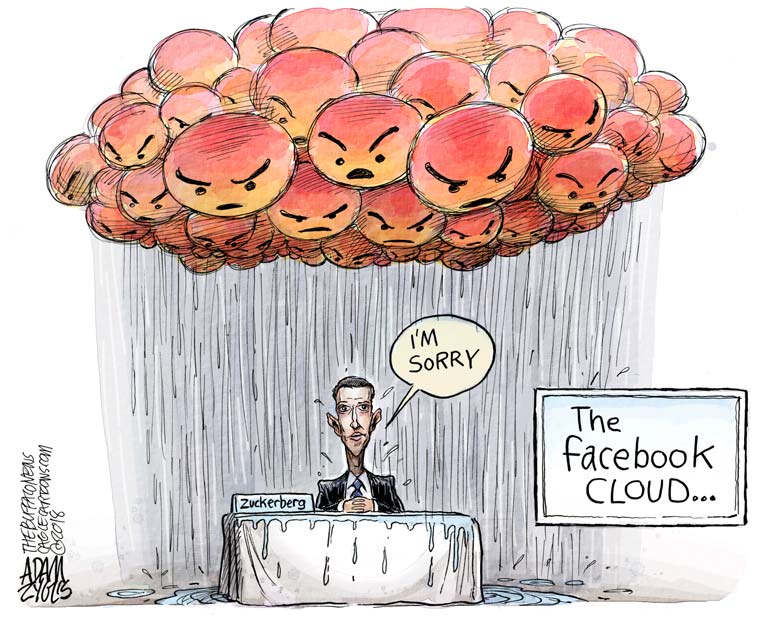
Hughes, who cofounded Facebook with Zuckerberg in a Harvard dorm room 15 years ago, makes a passionate and lengthy case for breaking up the social media giant in a commentary published by The New York Times. NPR and NBC also aired interviews on Thursday with Hughes.
"Mark's power is unprecedented and un-American," writes Hughes, a liberal who once owned the New Republic magazine. "Facebook's dominance is not an accident of history. The company's strategy was to beat every competitor in plain view, and regulators and the government tacitly - and at times explicitly - approved."
Hughes faults regulators for being asleep at the wheel and specifically criticizes the Federal Trade Commission for approving of Facebook's acquisition of Instagram and WhatsApp. "Mark's influence is staggering, far beyond that of almost anyone else in the private sector or in government," he writes. "The most problematic aspect of Facebook's power is Mark's unilateral control over speech. There is no precedent for his ability to monitor, organize and even censor the conversations of two billion people."
Facebook has increasingly been squeezed from the right and the left. The company's brand has taken an enormous hit since the Cambridge Analytica scandal, which spawned a series of investigations and intense scrutiny on both sides of the Atlantic, from the European Union to Canada and the U.S. Congress.
Zuckerberg has been trying to get out front of calls to break up his company by calling for new regulations, expressing openness to more oversight and promising users recently that the social network will reorient itself to prioritize privacy. The 34-year-old is worth an estimated $62.3 billion. Forbes pegs him as the eighth richest person in the world.
Facebook isn't afraid of "a few more rules," Hughes explains, because the company can afford to comply with them and pay billions in fines. Facebook recorded $15 billion in revenue during the first three months of this year, for instance, putting the publicly traded company on a pace to rake in $60 billion this year. The tech giant disclosed to shareholders last month that it expects a fine as high as $5 billion from the FTC for its mishandling of its users' personal information, and the markets shrugged.
Hughes believes that the federal government bringing an antitrust case is the only way to bring real accountability, which he believes is why Facebook is so strongly against it. "Mark may never have a boss, but he needs to have some check on his power," Hughes writes. "The American government needs to do two things: break up Facebook's monopoly and regulate the company to make it more accountable to the American people. . . . Just breaking up Facebook is not enough. We need a new agency, empowered by Congress to regulate tech companies. Its first mandate should be to protect privacy."
President Donald Trump threatened last Friday to "monitor" social media sites for their "censorship of AMERICAN CITIZENS" on the day after Facebook permanently banned far-right figures and organizations including the conspiracy theory site Infowars. The company also permanently banned users including Louis Farrakhan, the founder of the Nation of Islam who has been accused of anti-Semitism, along with far-right figures Milo Yiannopoulos, Laura Loomer and Alex Jones, the founder of Infowars. The company said their presence on Facebook and Instagram had become "dangerous."
Sen. Elizabeth Warren, D-Mass.,has made breaking up Facebook and other big tech companies a major plank of her 2020 platform. Sen. Amy Klobuchar, D-Minn., the ranking Democrat on the Senate subcommittee that oversees antitrust and competition policy, talks constantly about the danger of monopolies on the campaign trail. This is not some obscure debate for law school faculty lounges any longer. Crowds eat it up - in rural Iowa.
Hughes links Facebook's market power to the staggering, broader consolidation of corporate power. "In the past 20 years, more than 75 percent of American industries, from airlines to pharmaceuticals, have experienced increased concentration, and the average size of public companies has tripled," Hughes notes. "The results are a decline in entrepreneurship, stalled productivity growth, and higher prices and fewer choices for consumers."
He laments that Facebook has become almost too big to fail in the eyes of regulators. "The company's strategy was to beat every competitor in plain view, and regulators and the government tacitly - and at times explicitly - approved," he writes. "This means that every time Facebook messes up, we repeat an exhausting pattern: first outrage, then disappointment and, finally, resignation."
A bipartisan group of senators expressed frustration earlier this week with the slow-going federal probe into Facebook's privacy practices, pushing the FTC to move more swiftly and consider imposing tough punishments that target the company's top executives. "This investigation has been long delayed in conclusion - raising the specter of a remedy that is too little too late," Republican Sen. Josh Hawley of Missouri and Democratic Sen. Richard Blumenthal of Connecticut wrote in an open letter on Monday. "The public is rightly asking whether Facebook is too big to be held accountable. The FTC must set a resounding precedent that is heard by Facebook and any other tech company that disregards the law in a rapacious quest for growth."
Democratic lawmakers such as Sen. Ron Wyden, D-Ore., have even been pushing the FTC to specifically and personally target Zuckerberg himself as part of its investigation.
Many senior Democrats on Capitol Hill were especially irate about the public support that senior Facebook executive Joel Kaplan showed for Brett Kavanaugh after Christine Blasey Ford came forward last year. The company said Kaplan, a Republican and Facebook's policy chief, was acting in his personal capacity when he sat behind Kavanaugh during his confirmation hearing and hosted a party at his house for the justice to celebrate his triumph despite the allegations of sexual assault. This led to strong internal backlash from employees at Facebook. During an all-staff meeting, Kaplan said he should have checked with Zuckerberg ahead of time.
The donnybrook strained some of the company's relationships on the Hill and put in stark relief for congressional Democrats that Facebook is neither their friend nor ally. Facebook reinforced this view the week before last by hiring another Republican legal operative who worked with Kavanaugh during George W. Bush's administration to be their general counsel. To be sure, the company has also hired some prominent privacy advocates lately for other jobs.
Facebook chief operating officer Sheryl Sandberg has also lost a lot of her cachet with Democrats in the District of Columbia.She admitted in November that she received information about the company's work with a Republican-aligned firm called Definers that conducted opposition research against the company's critics on the left, including Democratic donor George Soros.
Meanwhile, there are daily reminders of how central Facebook has become in American culture. Consider these three unrelated stories that have posted in this week:
"Thousands of people who police Facebook's site for offensive content are contractors, not employees,and they're starting to air their grievances about unsatisfactory working conditions. They're protesting micromanagement, pay cuts and inadequate counseling support while they perform one of Facebook's most demanding jobs." (The Washington Post
"Facebook is auto-generating videos that celebrate extremist images. A whistleblower's complaint to the Securities and Exchange Commission alleges the social media giant has exaggerated its success at staying ahead of extremists by taking down their posts. Instead, the company has inadvertently made use of extremist propaganda in promotional videos that collect a year's worth of user content to make snazzy videos."(AP)
Instagram still has no control over the spread of vaccine misinformation on its platform, two months after Facebook promised that it would do a better job of combating the falsehoods. "Instagram executives said vaccine misinformation is not eligible for recommendation to its Explore, hashtag and search pages. But discussion about vaccines as a general topic is still allowed and can be recommended in these places," CNN reports. "An Instagram spokesperson added that its efforts are focused on vaccine misinformation, not the anti-vax movement. This means that Instagram wants to curtail false information about vaccines, but not ban people who identify as anti-vaxers or publish anti-vaccine posts."
In his commentary for The New York Times, Hughes apologizes for his role. "I'm disappointed in myself and the early Facebook team for not thinking more about how the News Feed algorithm could change our culture, influence elections and empower nationalist leaders," he writes.
Hughes doesn't fault Zuckerberg for trying to conquer the world. "Yet he has created a leviathan that crowds out entrepreneurship and restricts consumer choice," he writes. "It's on our government to ensure that we never lose the magic of the invisible hand."
Sign up for the daily JWR update. It's free. Just click here.
(COMMENT, BELOW)


 Contact The Editor
Contact The Editor
 Articles By This Author
Articles By This Author